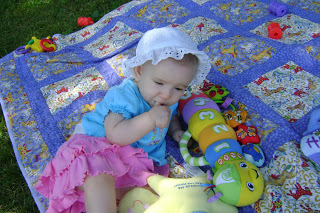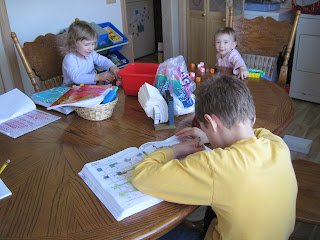Following two months of rain and clouds, the oppressive heat of summer arrived this week. Our languishing yellow squash--a summer staple in this house--may not make it, but the pumpkins are doing well. The tomatoes look terrific; the sweet banana peppers, not so much.
We went back to school full time following our exhausting but terrific Vacation Bible School week, during which Peter and I worked (me assigned to the church kitchen with my new homeschooling friend, and Peter with outdoor games).
On the hottest day this week we took a break in the air conditioning to enjoy a 2006 non-animated version of Charlotte's Web. Did I ever tell you that Fern from Charlotte's Web is a clone of my Mary? They share the same childhood wonder of all things nature-oriented; the same passionate, tender heart. The same love of comfortable, functional, tomb-boy clothes, followed by a transformation in the form of dresses on Sunday; the same love of the fanciful over the realistic.
Every day Mary goes outside deliberately making her rounds, turning over rocks and logs and whatever she can muscle, to uncover the hidden treasures: pill bugs, frogs, toads, and the occasional surprise creatures. She scours every bush and vine looking for tree frogs and praying mantises and cicadas. She walks carefully over the grass, eyes pining for grasshoppers.
When I see her from the window, running like mad, making a beeline for the front door, I know she's bursting to show me an amazing specimen from God. She and Peter, two peas in a pod, recently found 8 praying mantises on our church grounds, which are surrounded by fields and woods.
I told her she reminds me of Fern and my Mary smiled from ear to ear, knowing it was true.
Charlotte's Web, if you must know, is one of the greatest children's books ever written--not that I'm an authority or anything, but I do love children. Some of us love just our own children, and some of us love and see every child as supremely beautiful and amazing--the very best of God's heart outside of the Cross.
Mark 9:42 "If anyone causes one of these little ones--those who believe in me--to stumble, it would be better for them if a large millstone were hung around their neck and they were thrown into the sea.
Matthew 18:1-3 At that time the disciples came to Jesus, saying, “Who is the greatest in the kingdom of heaven?” And calling to him a child, he put him in the midst of them and said, “Truly, I say to you, unless you turn and become like children, you will never enter the kingdom of heaven.
Matthew 18:10 “See that you do not despise one of these little ones. For I tell you that in heaven their angels always see the face of my Father who is in heaven.
Charlotte's Web captures all that is sacred about childhood and bottles it. At the end when Charlotte dies, Mary and I cry buckets and it's a reminder to me that childhood passes as quickly as a spider's life. After we help them into their wedding veil and cumberbund and throw the rice--which seems about a month after they're born--it's an occasion of joy mixed with the bittersweet memories of bygone years.
"This is my egg sac, my magnum opus, my great work, the finest thing I have ever made." (Charlotte quote).
Charlotte's Web captures all that is sacred about childhood and bottles it. At the end when Charlotte dies, Mary and I cry buckets and it's a reminder to me that childhood passes as quickly as a spider's life. After we help them into their wedding veil and cumberbund and throw the rice--which seems about a month after they're born--it's an occasion of joy mixed with the bittersweet memories of bygone years.
"This is my egg sac, my magnum opus, my great work, the finest thing I have ever made." (Charlotte quote).
If you're a Momma, let that be your mantra. God gifts us with these precious, helpless, amazing wonders called children. No, they are not ours, but they are the work of our bodies, our hearts, our very lives. Each night when we go to bed and each morning upon waking, we must realize the miracle of their presence in our lives.
We can put nothing above their needs. We can put nothing unwholesome in front of them to corrupt their tender hearts. We can pursue not our personal dreams at their expense. We cannot be tempted by the world and its finery, chasing it at the expense of our children's salvation, which requires an incredible investment of time and heart.
Don't let the upcoming September busy season woo you--the season of running here and there, having our children trained by strangers in this and that endeavor so they'll shine for whatever Jones' we're trying to keep up with.
Let me tell you a secret: The Jones' don't love Jesus and they don't love your child, either. Our children are to shine for Him and Him only and the soccer, piano, and football teacher can't accomplish this holy endeavor. Schedule sparingly and wisely so you can speak life into your children's hearts.
Do we want future family gatherings to be tense and full of dysfunction, or joyful and full of life abundant, shared with children who serve Him most of all? Things can still go wrong, but the quality of our remaining years and theirs will depend greatly on the number of hours we're willing to invest in their hearts right now.
When you live for and make decisions that count for eternity, and have in your possession a dog-eared, well-read, marked-up Bible, you're blessed with all that God intended this side of Heaven.
Don't look for blessing in your health tests, your bank account, your clothing labels, your wheels, your furnishings, or your square footage. Look for it in the relationships you've invested in--with Him, and with your loved ones and neighbors.
Matthew 22:36-40 (source here)
36 “Teacher, which is the greatest commandment in the Law?”
37 Jesus replied: “‘Love the Lord your God with all your heart and with all your soul and with all your mind.’38 This is the first and greatest commandment. 39 And the second is like it: ‘Love your neighbor as yourself.’40 All the Law and the Prophets hang on these two commandments.”
What are you going to do today to speak life into your children?










































